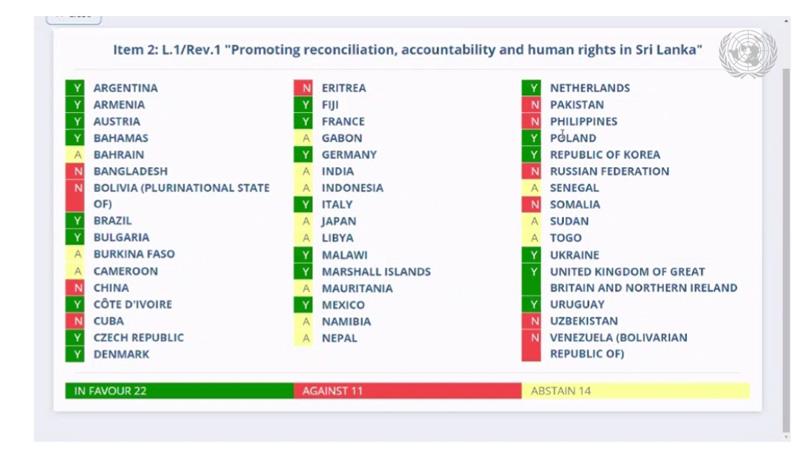The United Nations Human Rights Council passed a resolution on Sri Lanka today, calling for reconciliation and accountability on human rights violations said to have taken place at the last stages of the war and thereafter.
The resolution titled ‘Promotion of Reconciliation, Accountability and Human Rights in Sri Lanka’ was adopted with 22 voting for it and 11 against with 14 abstaining.
India was among those countries which abstained from voting.
The resolution was co-sponsored by the United Kingdom, Germany, Canada, Montenegro, North Macedonia and Malawi.
Prior to the voting, justifying the resolution, Britain’s representative said his country regretted that Sri Lanka had withdrawn from the earlier consensus resolution. He noted that the human rights situation in Sri Lanka had been deteriorating, especially in relation to minority rights.
Austria also said it supported the resolution.
The Philippines’s envoy described the resolution as not balanced and said it had not given due consideration to the progress Sri Lanka has made in terms of human rights promotion.
Sri Lanka’s Permanent Representative C.A. Chandraprema said the resolution was unwarranted, unjustified and a violation of relevant provisions of the UN charter and the UNHRC. He said Sri Lanka sees the resolution as of divisive nature. He added the Office of the Human Rights Commissioner (OHRC)'s role was unprecedented and posed a danger to all other countries.
Chandraprema said the resolution would polarise communities in Sri Lanka and impede economic development and therefore Sri Lanka would reject it.
Rejecting the resolution was China. Its permanent representative said the resolution smacked of double standards and was an attempt to interfere in the internal affairs of other countries under the guise of human rights. The resolution was a typical example of politicising human rights, he said.
China then called on the UNHRC members to vote against the resolution.
Japan said it recognised the need for improvement of human rights and reconciliation in Sri Lanka. He said Japan supported Sri Lanka’s efforts to human rights development and would abstain from voting.
Pakistan said it encourages dialogue with regard to human rights. Rejecting the resolution, the Pakistani envoy called on member states to recognise Sri Lanka’s national action plan on human rights development.
The envoy said Pakistan appreciated steps taken by Sri Lanka in addressing the grievances of the minorities over the issue of cremation of those who died of COVID-19. Pakistan voted against the development. Pakistan also called for a vote.
Also rejecting the resolution and speaking in support of Sri Lanka were Venezuela and Bolivia. Venezuella described the allegations as baseless and the resolution as an interventionist attempt by the sponsors.
Russia’s delegate said the sponsors of the draft resolution were not trying to support Sri Lanka to address its problems whcih need to be solved by initiating a dialogue. He said his country would not support the resolution.
Speaking in support of Sri Lanka, Cuba said the resolution was political and biased.
India’s envoy said that as an immediate neighbour India supported reconciliation and development in Sri Lanka. India’s position was based on the premise that it supports measures aimed at equality and dignity of Sri Lanka Tamils and that power devolution should be strengthened through Provincial councils. India said it would support Sri Lanka to carry forward the reconciliation process and moves aimed at addressing the aspirations of Tamils.

Leave Comments